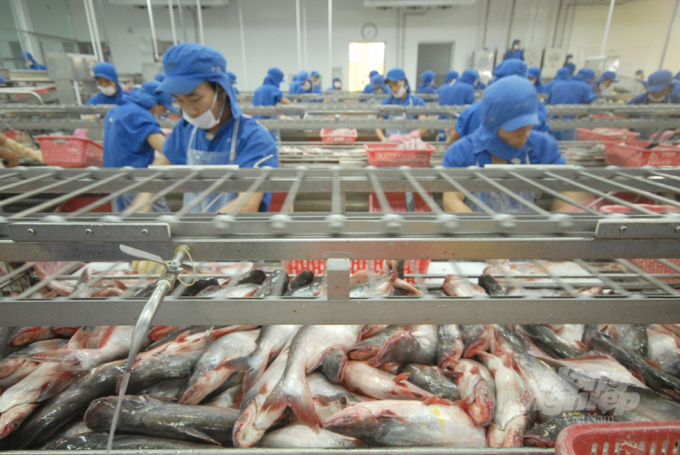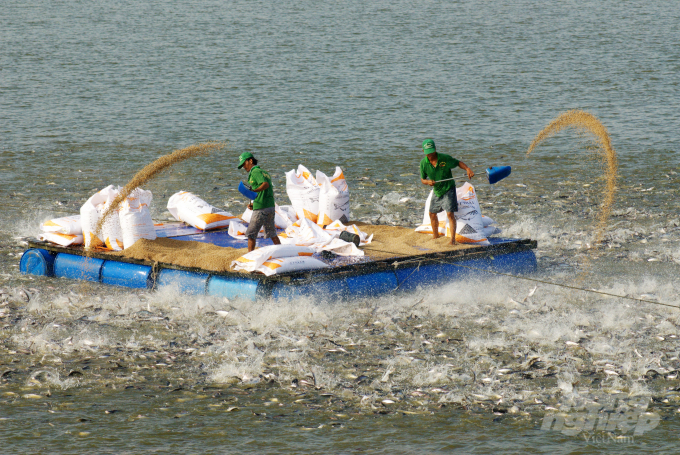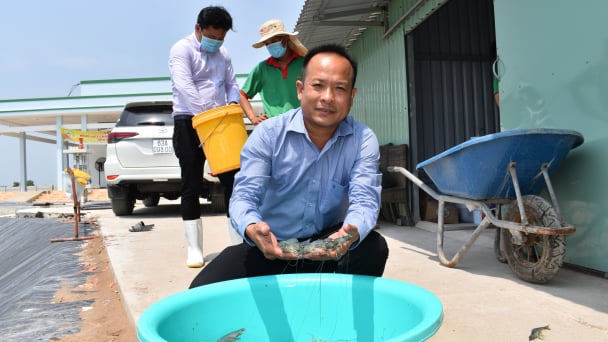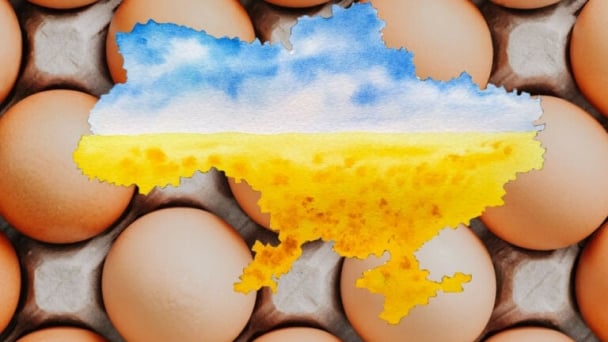May 21, 2025 | 09:12 GMT +7
May 21, 2025 | 09:12 GMT +7
Hotline: 0913.378.918
May 21, 2025 | 09:12 GMT +7
Hotline: 0913.378.918

More than half of tra fish factories in the Mekong Delta have had to stop working. Photo: Le Hoang Vu.
According to the Vietnam Association of Seafood Exports and Processing (VASEP), the immunization rate for Covid-19 has been between 40% and 50% in processing and seafood export companies. Ca Mau was the locality with the quickest and most vaccination registrations.
Beginning in late July, as the pandemic spread to Mekong Delta provinces, regional tra fish processing companies were the hardest hit, with up to 50% of enterprises in key zones ceasing operations.
As a result of the closure and decrease of maximum capacity, the fish produced in the ponds of those companies were oversized. In certain companies that raise tra fish, the farming period is extended and the density is excessive, resulting in the daily death of dozens of tons of fish. At now, the total capacity of the tra fish industry is believed to be between 10% and 20%.
According to reports from shrimp processing businesses in Ca Mau, Soc Trang, and Bac Lieu, the three provinces with the highest volume of shrimp production in the country, the Covid-19 pandemic situation developed unexpectedly, and the social distancing order hampered product circulation, seed trading, and shrimp farming, while factories reduced their processing capacity by 60%–70%.

The risk of breaking the seafood chain from aquaculture to export. Photo: Le Hoang Vu.
Almost all seafood processing companies in Hay Giang have closed due to their inability to fulfill the criteria of the "three on-sites" motto, a shortage of workers, and a challenge with circulation.
Numerous processing plants are situated in the "red zone," which prohibits all employees from the "green zone" from entering.
Initially, several manufacturers attempted to follow the "three on-sites" motto to preserve employment and to satisfy contracts and signed orders. They were, however, forced to close after one month owing to exorbitant costs such as motel rentals, dormitory accommodation, wages, food, medical care, and medical testing...
Following a time of social distancing in Da Nang, the area's seafood processing companies ceased operations. Some are expected to follow the "three on-sites" motto to maintain output, although there is a severe labor shortage for deep processing.
Certain shrimp companies in Da Nang are resolved to restart, purchasing just raw shrimp for the production of basic PD shrimp items. However, the price of this type of Vietnam cannot match that of India or Ecuador markets.
Enterprises in coastal areas like as Binh Dinh, Phu Yen, Khanh Hoa, Ba Ria - Vung Tau, and Kien Giang have reduced processing capacity and operate in moderation. Both fishermen and companies face significant challenges as a result of the closure of many fishing ports due to Covid-19 infections.
The percentage of employees and workers in the fishing sector who have been vaccinated remains very low in several coastal regions, and the expense of the "three on-sites" procedure is prohibitively expensive. As a result, several companies have contemplated ceasing operations entirely if, before September 15, the pandemic situation in areas remains unavoidable and social distancing restrictions remain in place.
VASEP examined 100% of companies and found that the "three on-sites" mantra is just a temporary solution for businesses to sustain output. If the Government and local governments do not take immediate action to restore, the danger of the whole production chain collapsing from agriculture to exploitation, processing, trade, import, and export is inevitable.
According to many shrimp processing and export companies, the Vietnamese shrimp sector has fallen behind market possibilities as a result of Covid-19.
However, if communities can rapidly find ways to manage the pandemic and restore output by the end of August, there are still possibilities and shrimp prices will rise again. And if it is later, consider the chance for this year to have passed.
September marks the start of the peak season for shrimp factories in terms of raw material acquisition, processing, and export. However, given the present state of affairs, it seems likely that shrimp supply will be reversed and reduced until the end of the year, perhaps into 2022.
Translated by Linh Linh

(VAN) One of the key factors for businesses to effectively take advantage of tariff preferences under these FTAs is the rules of origin.

(VAN) Oliyar, a prominent Ukrainian oil and fat manufacturer, has revealed plans to build a farm for 2.3 million laying hens in the Lviv region. The additional production quantities promise to change the competitive landscape of the egg market of the Eastern Europe region.

(VAN) On May 15, Ministry of Agriculture and Environment of Vietnam hosted the 'Connecting Vietnam - Germany agricultural, forestry and fishery trade' seminar in Berlin, Germany.

(VAN) In the face of counterfeit and imitation products, Khanh Hoa Salanganes Nest Company hopes for the prompt completion of the legal framework, strict enforcement against violations, and protection of the bird’s nest brand.

(VAN) Japan's efforts to lower the price of rice through the release of its stockpile may finally be making some progress, albeit at a snail's pace.

(VAN) U.S. tariffs are not only a 'shock', but also an opportunity for Vietnamese businesses to renew their mindset toward comprehensive development.

(VAN) As Bac Giang lychee enters the harvest season, Minister Do Duc Duy expects that the fruit will contribute greatly to agricultural exports due to standardized production and deep processing.